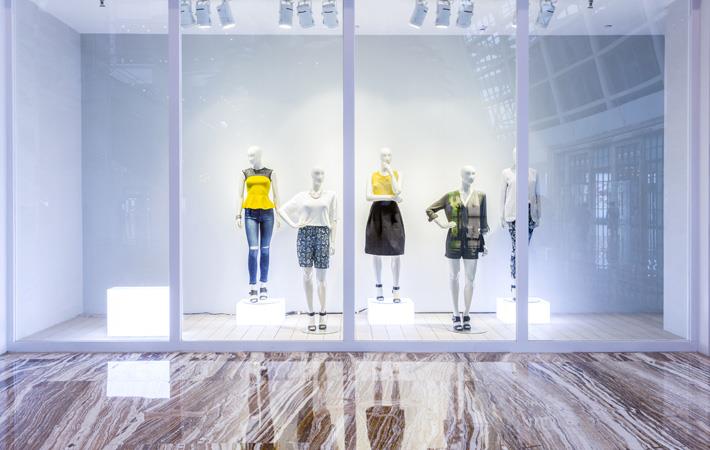Interviews
Fashion sector could unlock $100 bn in value: Barclays
24 Jan '20
3 min read

Pic: Shutterstock
The fashion industry can unlock some €110 billion ($123 billion) in value by addressing key environmental issues related to water, energy, chemicals and waste, according to a recent report titled ‘Green is the new black’ released by investment bank and financial services firm Barclays, which said if business continues as usual, €45 billion in profit is at risk by 2030.
Barclays sees profit risk from rising input costs as well as looming regulation, shifting popular opinion, and increasing pressure from consumers concerned about climate change and micro-plastic pollution, according to global newswires.
The industry’s “immense water-consuming, energy-exhausting, and wasteful supply chain practices are creating an environmental and social concern that we can no longer afford to ignore,” said the authors, led by Anushka Challawala and Hiral Patel.
Environmental, social and governance concerns for investors have come to the forefront in recent years, with multiple fund launches and flows pouring into the strategy. Stock allocation to so-called environmental, social and governance (ESG) funds have increased sharply, while investors have also turned to green bonds in their search for yield.
Fashion accounts for 8 per cent of global greenhouse-gas emissions, more than international flights and maritime shipping put together, according to Barclays. And an estimated $500 billion in value is lost each year due to ‘clothing being barely worn and rarely recycled’.
Analysts at the London-based bank drew from estimates by Boston Consulting Group, the non-profit Global Fashion Agenda and the Ellen MacArthur Foundation, which promotes thinking on a circular economy.
With conventional cotton and virgin polyester making up about 85 per cent of total fibres in today’s apparel, Barclays sees the need for more sustainable materials in the mix. Other proposed solutions include increasing resource efficiency in processing and manufacturing of clothing as well as reducing post-consumer waste--an issue worsened by the fast-fashion era and overconsumption.
In the European Union, Asos Plc and Boohoo Group Plc are more exposed to these issues due to their “reliance on affordable prices and rapid consumer trends,” according to Barclays analysts. Meanwhile, Associated British Foods Plc’s Primark stands out for its focus on sustainable cotton and brick-and-mortar stores, avoiding the ‘last-mile environmental impact’ of home delivery and returns.
Hennes & Mauritz AB, an early mover in sustainability efforts, has lately become interested in scaling up experimental materials including pineapple leather, lab-grown cotton and mushroom leather, Barclays said.
Among US apparel companies, the report highlights Nike Inc., Gap Inc., Lululemon Athletica Inc., PVH Corp., Ralph Lauren Corp. and VF Corp. as best positioned, while EBay Inc. would stand to benefit from a business model that emphasises second-hand, rental and direct-to-consumer.
As for Amazon.com Inc., Barclays analyst Ross Sandler in the report said the e-commerce giant became ‘significantly more transparent’ last year by releasing its sustainability goals, and remains ‘well placed’ as the industry shifts toward sustainable practices.
Barclays sees profit risk from rising input costs as well as looming regulation, shifting popular opinion, and increasing pressure from consumers concerned about climate change and micro-plastic pollution, according to global newswires.
The industry’s “immense water-consuming, energy-exhausting, and wasteful supply chain practices are creating an environmental and social concern that we can no longer afford to ignore,” said the authors, led by Anushka Challawala and Hiral Patel.
Environmental, social and governance concerns for investors have come to the forefront in recent years, with multiple fund launches and flows pouring into the strategy. Stock allocation to so-called environmental, social and governance (ESG) funds have increased sharply, while investors have also turned to green bonds in their search for yield.
Fashion accounts for 8 per cent of global greenhouse-gas emissions, more than international flights and maritime shipping put together, according to Barclays. And an estimated $500 billion in value is lost each year due to ‘clothing being barely worn and rarely recycled’.
Analysts at the London-based bank drew from estimates by Boston Consulting Group, the non-profit Global Fashion Agenda and the Ellen MacArthur Foundation, which promotes thinking on a circular economy.
With conventional cotton and virgin polyester making up about 85 per cent of total fibres in today’s apparel, Barclays sees the need for more sustainable materials in the mix. Other proposed solutions include increasing resource efficiency in processing and manufacturing of clothing as well as reducing post-consumer waste--an issue worsened by the fast-fashion era and overconsumption.
In the European Union, Asos Plc and Boohoo Group Plc are more exposed to these issues due to their “reliance on affordable prices and rapid consumer trends,” according to Barclays analysts. Meanwhile, Associated British Foods Plc’s Primark stands out for its focus on sustainable cotton and brick-and-mortar stores, avoiding the ‘last-mile environmental impact’ of home delivery and returns.
Hennes & Mauritz AB, an early mover in sustainability efforts, has lately become interested in scaling up experimental materials including pineapple leather, lab-grown cotton and mushroom leather, Barclays said.
Among US apparel companies, the report highlights Nike Inc., Gap Inc., Lululemon Athletica Inc., PVH Corp., Ralph Lauren Corp. and VF Corp. as best positioned, while EBay Inc. would stand to benefit from a business model that emphasises second-hand, rental and direct-to-consumer.
As for Amazon.com Inc., Barclays analyst Ross Sandler in the report said the e-commerce giant became ‘significantly more transparent’ last year by releasing its sustainability goals, and remains ‘well placed’ as the industry shifts toward sustainable practices.
Fibre2Fashion News Desk (DS)
Popular News
Leave your Comments
Editor’s Pick
Folker Stachetzki
Brother Internationale Industriemaschinen GmbH
Dr. Michael Duetsch & Man Woo Lee
UPM Biochemicals and Dongsung Chemical
Jason Kent
British Textile Machinery Association (BTMA)
































-Ltd..jpg?tr=w-120,h-60,c-at_max,cm-pad_resize,bg-ffffff)





.jpg?tr=w-120,h-60,c-at_max,cm-pad_resize,bg-ffffff)
.jpg?tr=w-120,h-60,c-at_max,cm-pad_resize,bg-ffffff)






